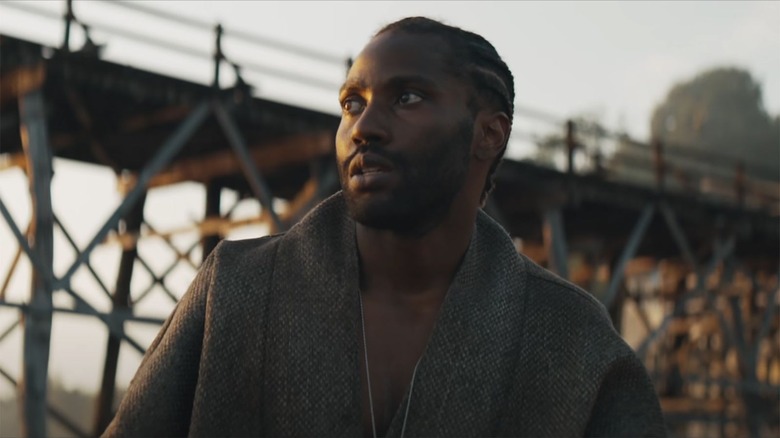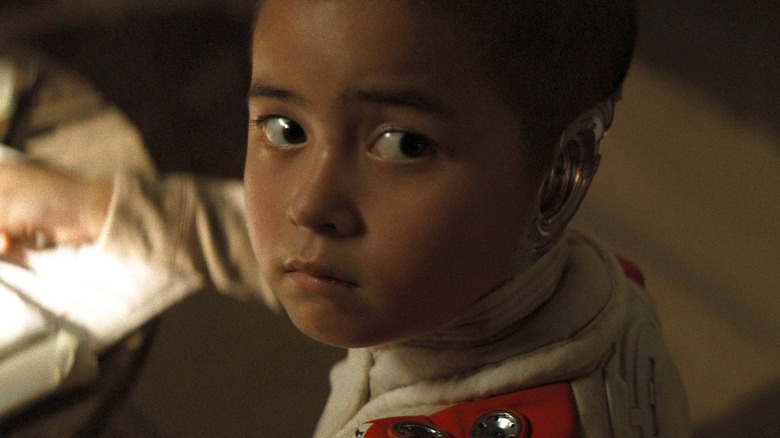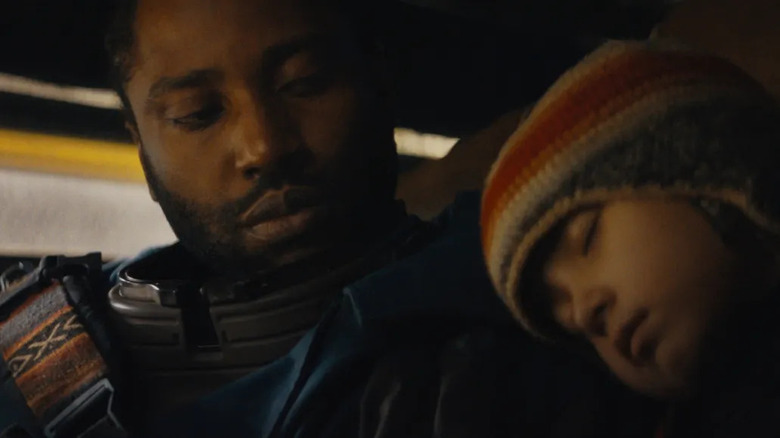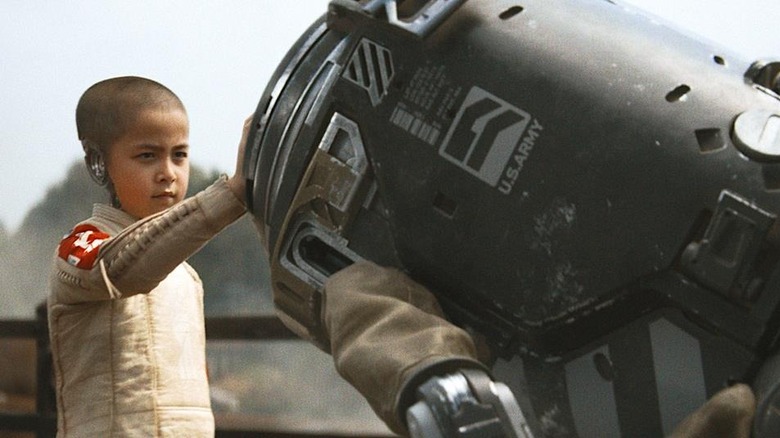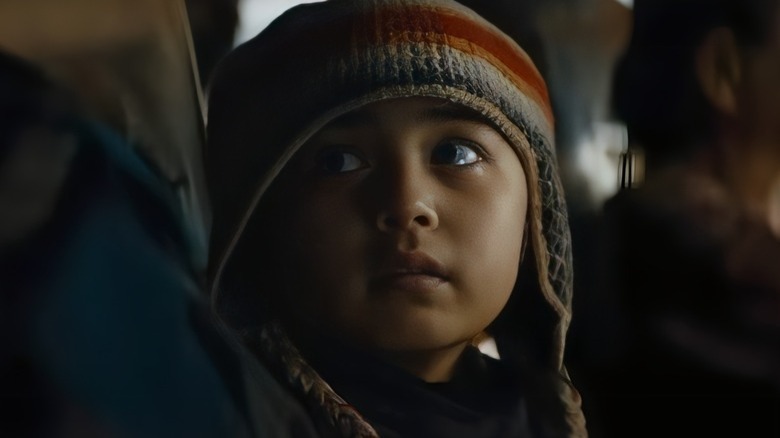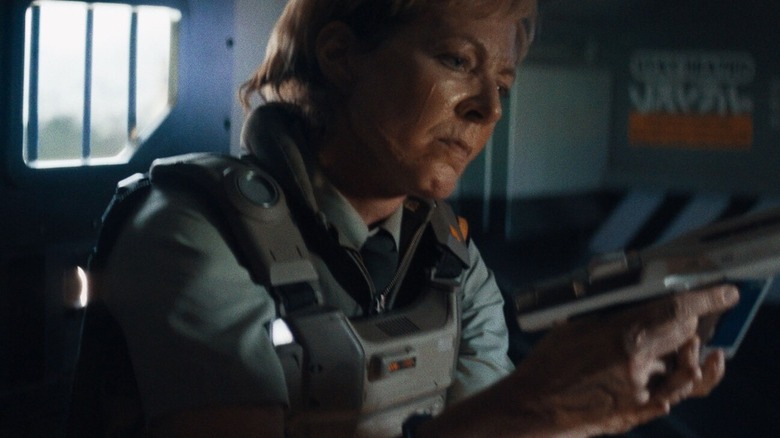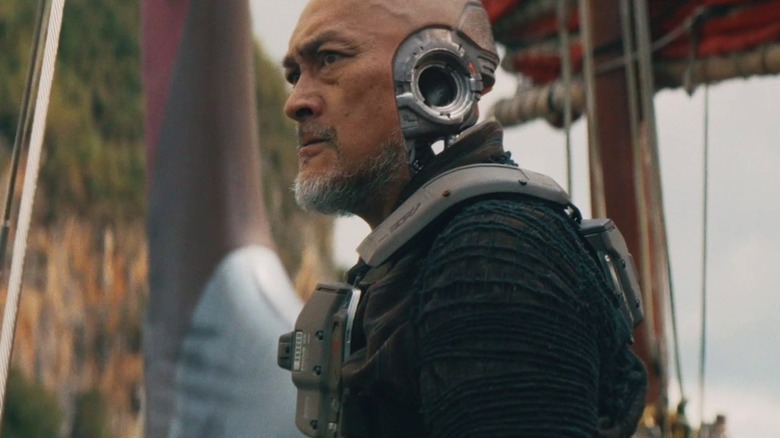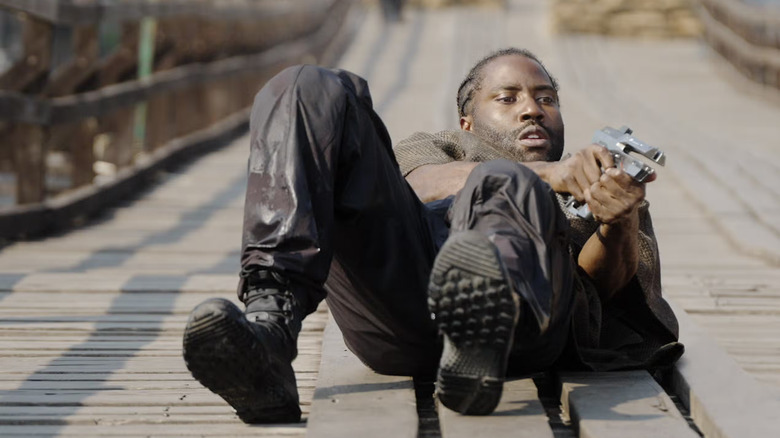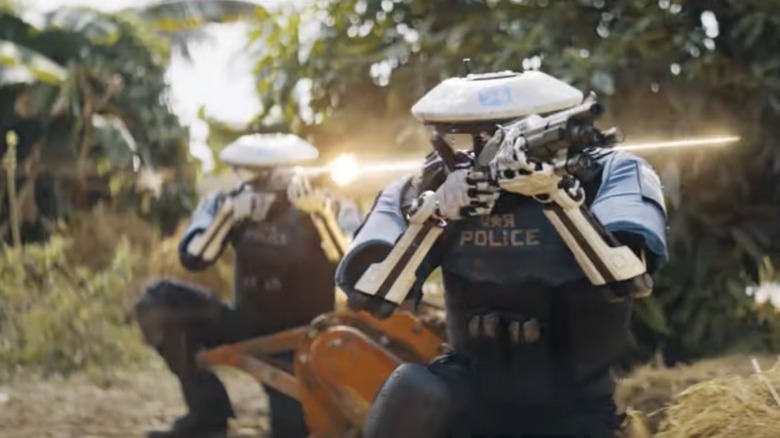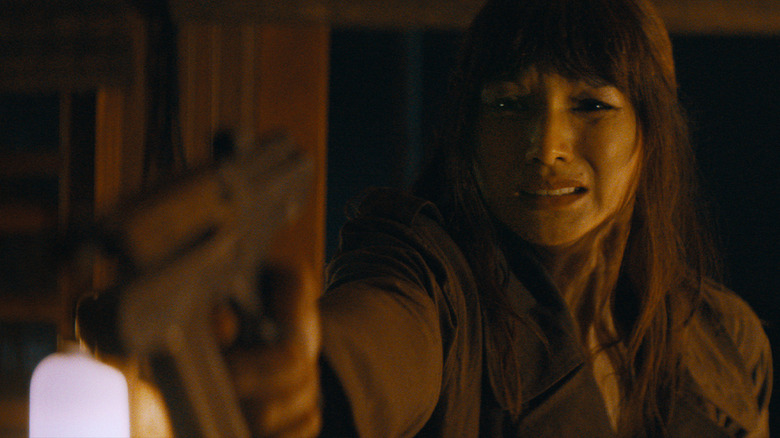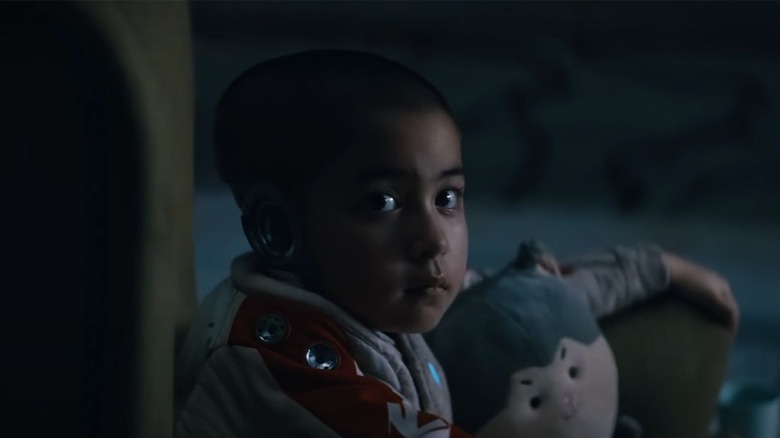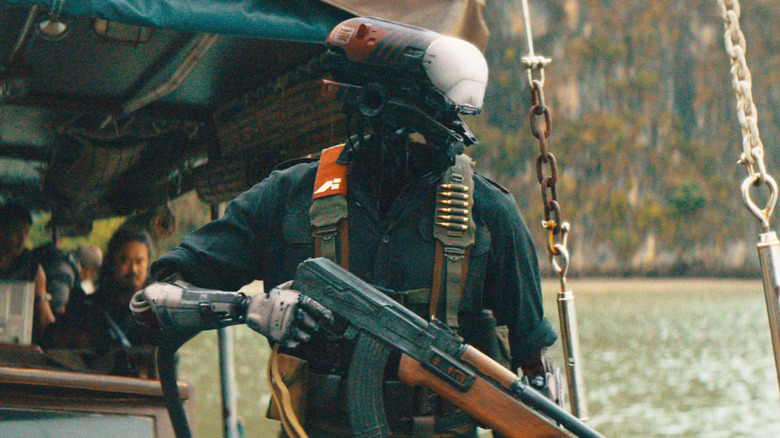The Ending Of The Creator Explained
Contains spoilers for "The Creator"
Gareth Edwards — the director behind "Rogue One" and "Godzilla" (2014) — returns for a new original sci-fi action epic called "The Creator," which taps directly into the growing conversations surrounding our connection with artificial intelligence (AI). The film takes viewers into a world where the West and the East are locked in a vicious war over the East's continued development of a mysterious AI that is believed to be capable of destroying the West's greatest weapon — The Nomad. Haunted American soldier Joshua (John David Washington) is tasked with bringing in this new AI to be eliminated, but only comes across a child AI simulant he names Alphie (Madeleine Yuna Voyles). Now, Joshua finds himself caught between two worlds and dealing with the mistakes of his past as he builds an emotional connection to Alphie that changes his perspective.
"The Creator" breathes new life into the sci-fi genre with its timely focus on AI and character-driven narrative full of unexpected heart. The film not only provides stunning visuals and performances, but also intriguing themes and connections to real-life discussions on the impact of AI on our lives. All in all, there's a lot to talk about with the film's ending and the strong connections that "The Creator" currently has to our culture. So, let's look at the ending of "The Creator" and delve into its vast ideas on the current state of AI and global conflict.
What you need to remember about the plot
Before we get to the finale of "The Creator." though, let's do a quick recap. After being undercover in an Eastern resistance army, Joshua now heads back to the East for a new mission to help American forces find a new AI project from a mysterious guru known as Nirmata. When his team arrives at a lab holding the coveted AI, he finds that it's actually a simulant — the word the film uses for human-looking robots with AI programming — that appears to be a child. With Joshua believing that this child — who he names Alphie — can lead him to his estranged wife Maya (Gemma Chan), he takes Alphie on a journey to find Maya and the old rebellion he once betrayed.
Along the way, Joshua learns that Maya is actually Nirmata, and the nuclear bomb that kicked off this whole war against AI was due to human error. It also turns out that Alphie was created to destroy Nomad, but only to achieve peace since the AI don't really want to kill the humans. As their journey continues, Joshua becomes closer to Alphie, due to the love Maya poured into creating her as she is molded after Joshua and Maya's child. Unfortunately, by the time Joshua and Alphie reach Maya, she's in a coma, and they can only cut her life support to set her free. They do so, but are captured by American forces and now must enact a new plan to destroy the Nomad.
What happens at the end of the movie?
After reuniting and escaping from the American forces, Joshua and Alphie now find themselves looking to get onto a ship to a moon colony. Once onboard, Alphie uses her ability to control the technology around her to pilot the ship towards the orbiting Nomad — which is priming missiles to fire at the remaining resistance bases. Their arrival on the Nomad spins everything into chaos, as Joshua is forced to go out into open space to put a bomb onto the Nomad's missiles and Alphie must make a mad dash to the control room. While these are tough obstacles they're forced to overcome, their plan ultimately works and they're able to cause a chain-reaction explosion on the Nomad.
Unfortunately, their escape plans are upended by the interference of the American government, and Joshua is forced to stay behind while Alphie gets away. They share one last tearful interaction that sees them express their love for one another, and Joshua tells Alphie that he now gets to go to heaven because of their journey together. Although this would seem like a sad ending for this unlikely pairing, it ends up being joyous. Joshua is allowed one last goodbye with Maya since Alphie put her brain data into a simulant that looks like her, and the two embrace before being consumed by the explosion. Alphie is seen celebrating with the revolutionaries, and now knows her vision of peace can be achieved.
What does the end of the movie mean?
One of the overarching themes of "The Creator" is depicting the impact and people's perceptions of AI. While it was initially seen as a tool to help humans do menial tasks or even expand our forms of entertainment to a degree, it eventually became something you either loved or loathed. In the film, after the unprovoked dropping of a nuclear bomb over Los Angeles kills thousands, the world is divided into two ideologies — those who believe that AI is going to make humanity extinct, and those who believe that AI can live alongside people peacefully. This debate is seen throughout the film and is a huge part of Joshua's personal arc as he starts to see the AI entities around him in the same vein as Maya — that they're truly almost human.
This debate will be something that we will continue to have as AI develops even further in the real world. "The Creator" instantly taps into these growing fears and concerns that many have about AI, and it's certainly becoming a bigger conversation as we see more programs like ChatGPT widely used. Even the recent WGA and ongoing SAG-AFTRA strikes have been heavily influenced by the growing use of AI and its effects on people's livelihoods. "The Creator" hits right at the heart of where AI stands in our society and makes us question whether we'll see it as an enemy or ally as it evolves.
Another possible explanation
As Alphie and Joshua destroy Nomad, the entire tide of the war changes. This weapon had been the key way for the West to pummel the Eastern resistance, since they didn't have to get many of their troops involved and the Nomad required less logistical planning for an effective attack. It fired missiles from high in the atmosphere that easily caused massive destruction to rebel bases. The only thing keeping the West from outright defeating the East and killing their AI was Alphie since she had the power to control any technology around her — including the Nomad.
So when Alphie and Joshua finally blow the Nomad to smithereens, it essentially ensures the East the ability to win, allowing AI to live freely. Maya's vision for Alphie to create peace around the world is now achievable, and the smile on Alphie's face embodies the tides of war changing heavily in their direction. We may never know what exactly happens as a result of the war, but the destruction of Nomad certainly works in the favor of the East, and Alphie, Joshua, and Maya will easily be seen as tide-turners who created peace between AI and humans.
Maybe humans are a part of the problem
One of the more eye-opening moments of "The Creator" is when Harun (Ken Watanabe) is talking to Joshua about what really caused the nuclear bomb to fall on L.A. While the common belief is that an AI program dropped the bomb without cause, Harun actually says that it was an error in the programming codes caused by humans. Given that the AI and simulants have been created by humans as well, it seems like the West should really be pointing the fingers at themselves. After all, AI wouldn't exist without humans creating it. It seems like a lot of problems in this world circle back towards humans, and it reflects our lack of accountability for our actions.
Instead of questioning why we decided to create AI in the first place or have self-reflective moments of change, humanity decided to point the blame toward AI and set out on the quest to destroy them, leaving the world hanging in the balance. Also, when we look at the effects of climate change and other major issues currently affecting the world, that same type of lack of self-accountability can be seen. Perhaps Edwards is trying to create a cautionary message with this line — showing that we need to take accountability for our actions if we want to make things better, rather than finding something or someone to take the fall.
Hypocrisy at its finest
Although most of the American soldiers and government figures are shown to hate AI due to past devastation, lingering fears, or personal trauma, there's a moment late in the film that highlights their hypocrisy. When Alphie is roaming the Nomad, she eventually gets into a room where various AI simulants can be seen standing around, covered in white fabric. It looks like an AI testing lab, and some of the subjects even look like Maya. Even though there's unbridled hatred toward AI and plans for their destruction, it seems like America is still toying around with the concept of using them.
It's even worse that Alphie found all of this on the Nomad — the weapon designed to wipe out the AI simulants and the Eastern resistance. In reality, this probably shows that the West's plans were never to completely wipe out AI. Rather, they wanted to eliminate what the East had, and then restart their own AI efforts with no opposition. It's certainly suspicious that the Nomad would have any simulants in it, and it reeks of horrible hypocrisy that gives new meaning to the villainous tones the West have in the film.
Growing conflicts between the West and the East
The film being a globe-spanning war between the West and East isn't by accident, and is likely inspired by the current geopolitical tensions. It's no secret that there's some ideological conflicts between the "West" –- namely the US and European countries -– and the "East" –- with countries like Russia, China, and North Korea being major standouts. These visions of communism versus democracy as well as paranoia surrounding military power and signs of aggression have created uneasiness around the globe and made many concerned that these tensions could spin into a full-blown war.
"The Creator" certainly plays on those fears by having the focal point of its West versus East conflict be AI and the fears of what it can do. If AI technology continues to develop at a rapid pace, the fears of the film could easily meld into the already real tensions we're feeling. It's not to say the film is establishing some sort of fearmongering or that it's predicting future conflict, but its ties to the tense atmosphere between Western and Eastern nations shouldn't be lost on audiences.
A reflection of the Iraq War
Along with ties to current global conflicts and tensions, "The Creator" evokes memories of the lasting impact and devastation of 9/11 that eventually led to the Iraq War. The film depicts the resulting war of a terrorist attack that saw many die and changed the entire perspective of the West, their sense of security, and spurred hatred toward an enemy they saw as unlike themselves. How could that not be seen as similar to what happened with the US after September 11? Like the real-life terrorist attack, the nuclear explosion in Los Angeles continues to be a long-lasting nightmare for those affected and drives their anger toward AI.
The repercussions of September 11 are a seemingly neverending war, as well as horrifying deaths that could've been avoided and an overwhelming sense of fear that'll take decades to shake. There's no doubt that writers Gareth Edwards and Chris Weitz take inspiration from major historical events that have shaped our world, just like the war against AI does in the film, and there are shadows of 9/11 and the Iraq War that don't go unseen in "The Creator."
The ripples and trauma of war
Although the film doesn't delve too deep into the impact of the nuke being dropped into L.A. or the long years of war, there are some moments that show the ripples of trauma these events have caused. When Joshua is cleaning the remaining rubble in L.A. it's hard not to feel your heart sink at all the ash that covers the area, and the gut-wrenching visual of a mother and her child succumbing to the blast in the backseat of their car. Colonel Howell (Allison Janney) is haunted by the reality of her sons not only dying in the war, but joining up in the first place because of her.
Even when Joshua is roaming through the East territories, it's easy to feel how this war has ravaged and ripped apart communities, forcing people to constantly live in fear. "The Creator" shows the impact of a global war, and it's another instance of the film acting as a visual warning of what we're currently dealing with. There are emotional scars and irreversible destruction that all stem from these conflicts, and it's a swift reminder of how war and tragedy have far-reaching effects that impact everyone — even those not on the battlefield.
The meaning of heaven
One of the more interesting aspects of Joshua and Alphie's experience together and the ending of their journey in the East is their perception of heaven. At first, Joshua gives Alphie the standard definition of heaven being a place where good people go — which surprisingly comforts Alphie, since she's not a person and she believes that Joshua isn't good. However, Alphie and Joshua both end up reaching "heaven" on Earth — which is where Maya is resting, now acting as a peaceful place where simulants, AI, and people can co-exist peacefully. It's a setting that not only has interesting religious undertones with its Buddhist inspiration, but also alters Joshua and Alphie's perspective on how one can reach heaven.
Their beliefs about heaven being some fantastical place in the sky change, and they eventually understand that heaven can be achieved on Earth. Maya's vision for Alphie to create a more peaceful world can be their real-life heaven, and by the end of the film that's exactly what's set in motion. Although Maya and Joshua can't join her in this world, their efforts have helped her build this new world and embody the concept of heaven as they have come to understand it.
What does the ending mean for a potential sequel?
Now, for the all-important question that needs to be asked: Is there potential for a sequel for "The Creator" to be made? The short answer is yes — but it doesn't feel too likely. In terms of the story, the film ends on a conclusive note, but has the potential to continue. The next film could easily see Alphie lead the resistance to completely win the war or further explore the world of peace she's trying to build on her own now. Obviously, the film's performance at the box office will heavily indicate if a sequel really comes to light, but it seems like — at least as far as director Gareth Edwards is concerned — "The Creator" will be one-and-done.
In an interview with ScreenRant, Edwards said that he has no plans at the moment to pen a sequel and is more than satisfied with the film's ending. "My favorite part of the story is the end," said Edwards, "and so I just want it to be this self-contained thing. If someone ever came up and said, 'We want a sequel.' That'd be a really good problem to have. But it is not the plan." So, it seems like "The Creator" won't have a sequel coming anytime soon, and Alfie's journey will simply end with smiles and celebrations.
